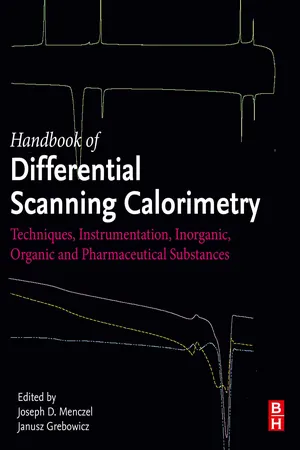
Handbook of Differential Scanning Calorimetry
Techniques, Instrumentation, Inorganic, Organic and Pharmaceutical Substances
- 874 pages
- English
- ePUB (mobile friendly)
- Only available on web
Handbook of Differential Scanning Calorimetry
Techniques, Instrumentation, Inorganic, Organic and Pharmaceutical Substances
About This Book
Differential scanning calorimetry (DSC) is the most important thermal analysis technique used today and the most common thermal analysis instrument found in chemical characterization laboratories. DSC has become an everyday tool in characterization laboratories, but many researchers using this technique have a limited understanding of the true breadth of its capabilities. Up to now, there has been no book that would describe the application of DSC in all the various areas of materials chemistry. The Handbook of Differential Scanning Calorimetry has been written to fill that void. This book is designed to summarize the knowledge of differential scanning calorimetry so that materials researchers and application chemists are given both a better understanding of techniques, as well as a review of the full scope of its capabilities. It also discusses how to properly interpret the DSC thermograms data obtained. Included in this work is the most up-to-date information written by some of the leaders in the field. It is written not only to help users get the most out of their equipment, After reading this book, people in all chemical and biological areas will have a broad overview of this measuring technique, and will be able to utilize this analytical technique more efficiently.
- Provides a detail description of the theory behind differential scanning while simultaneously providing a wider breadth of understanding of the actual DSC technique
- Includes a review of the basics of heat flux and power compensation DSC's, as well as separate chapters on inorganic and organic materials
- Reviews the most common commercial DSC instruments on the market and their uses, including TA Instruments, Perkin-Elmer, Hitachi, Mettler Toledo, Netzsch, and Setaram
Frequently asked questions
Information
Table of contents
- Cover image
- Title page
- Table of Contents
- Copyright
- Dedication
- Contributors
- Preface
- Chapter 1: Fundamentals of DSC
- Chapter 2: The Theory of Modulated Temperature Differential Scanning Calorimetry
- Chapter 3: Chip-Based Fast Scanning Calorimetry
- Chapter 4: DSC of Inorganic Materials
- Chapter 5: DSC of Low Molecular Mass Organic Materials and Pharmaceuticals
- Chapter 6: Simultaneous DSC Techniques
- Chapter 7: Instrumentation
- Index